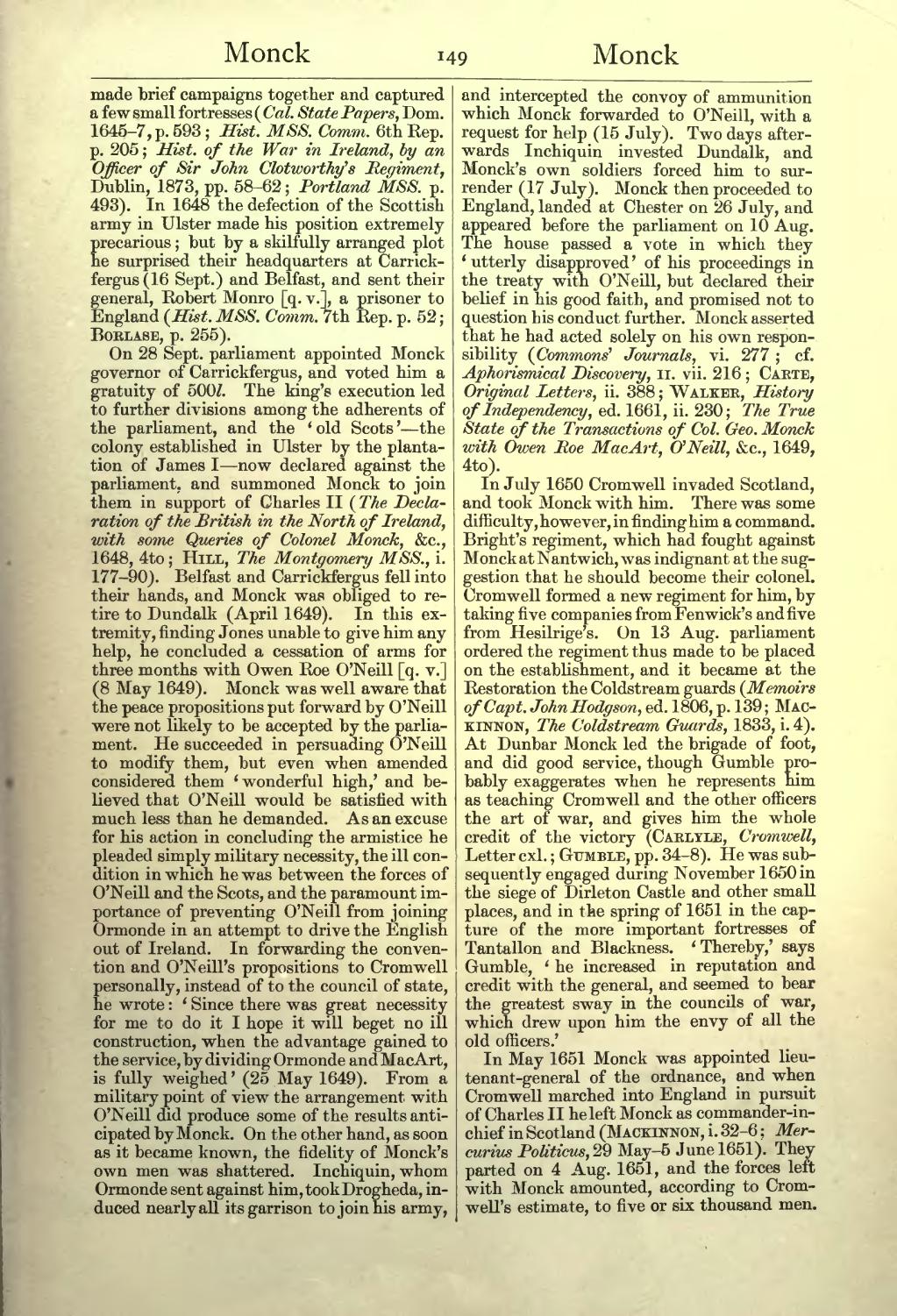made brief campaigns together and captured a few small fortresses (Cal. State Papers, Dom. 1645-7, p. 593 ; Hist. MSS. Comm. 6th Hep. p. 205 ; Hist. of the War in Ireland, by an Officer of Sir John Clotworthy 's Regiment, Dublin, 1873, pp. 58-62 ; Portland MSS. p. 493). In 1648 the defection of the Scottish army in Ulster made his position extremely precarious ; but by a skilfully arranged plot he surprised their headquarters at Carrickfergus (16 Sept.) and Belfast, and sent their general, Robert Monro [q. v.], a prisoner to England (Hist. MSS. Comm. 7th Rep. p. 52; Borlase, p. 255).
On 28 Sept. parliament appointed Monck governor of Carrickfergus, and voted him a gratuity of 500l. The king's execution led to further divisions among the adherents of the parliament, and the 'old Scots ' the colony established in Ulster by the plantation of James I now declared against the parliament, and summoned Monck to join them in support of Charles II (The Declaration of the British in the North of Ireland, with some Queries of Colonel Monck, &c., 1648, 4to ; Hill, The Montgomery MSS., i. 177-90). Belfast and Carrickfergus fell into their hands, and Monck was obliged to retire to Dundalk (April 1649). In this extremity, finding Jones unable to give him any help, he concluded a cessation of arms for three months with Owen Roe O'Neill [q. v.] (8 May 1649). Monck was well aware that the peace propositions put forward by O'Neill were not likely to be accepted by the parliament. He succeeded in persuading O'Neill to modify them, but even when amended considered them 'wonderful high,' and believed that O'Neill would be satisfied with much less than he demanded. As an excuse for his action in concluding the armistice he pleaded simply military necessity, the ill condition in which he was between the forces of O'Neill and the Scots, and the paramount importance of preventing O'Neill from joining Ormonde in an attempt to drive the English out of Ireland. In forwarding the convention and O'Neill's propositions to Cromwell personally, instead of to the council of state, he wrote : 'Since there was great necessity for me to do it I hope it will beget no ill construction, when the advantage gained to the service, by dividing Ormonde and MacArt, is fully weighed' (25 May 1649). From a military point of view the arrangement with O'Neill did produce some of the results anticipated by Monck. On the other hand, as soon as it became known, the fidelity of Monck's own men was shattered. Inchiquin, whom Ormonde sent against him, took Drogheda, induced nearly all its garrison to join his army, and intercepted the convoy of ammunition which Monck forwarded to O'Neill, with a request for help (15 July). Two days afterwards Inchiquin invested Dundalk, and Monck's own soldiers forced him to surrender (17 July). Monck then proceeded to England, landed at Chester on 26 July, and appeared before the parliament on 10 Aug. The house passed a vote in which they ' utterly disapproved ' of his proceedings in the treaty with O'Neill, but declared their belief in his good faith, and promised not to question his conduct further. Monck asserted that he had acted solely on his own responsibility (Commons' Journals, vi. 277 ; cf. Aphorismical Discovery, n. vii. 216 ; Carte, Original Letters, ii. 388 ; Walker, History of Independency, ed. 1661, ii. 230; The True State of the Transactions of Col. Geo. Monck with Owen Roe MacArt, O'Neill, &c., 1649, 4to).
In July 1650 Cromwell invaded Scotland, and took Monck with him. There was some difficulty, however, in finding him a command. Bright's regiment, which had fought against Monck at Nantwich, was indignant at the suggestion that he should become their colonel. Cromwell formed a new regiment for him, by taking five companies from Fenwick's and five from Hesilrige's. On 13 Aug. parliament ordered the regiment thus made to be placed on the establishment, and it became at the Restoration the Coldstream guards (Memoirs of Capt. John Hodgson, ed. 1806, p. 139 ; Mackinnon, The Coldstream Guards, 1833, i. 4). At Dunbar Monck led the brigade of foot, and did good service, though Gumble probably exaggerates when he represents him as teaching Cromwell and the other officers the art of war, and gives him the whole credit of the victory (Carlyle, Cromwell, Letter cxl. ; Gumble, pp. 34-8). He was subsequently engaged during November 1650 in the siege of Dirleton Castle and other small places, and in the spring of 1651 in the capture of the more important fortresses of Tantallon and Blackness. ' Thereby,' says Gumble, 'he increased in reputation and credit with the general, and seemed to bear the greatest sway in the councils of war, which drew upon him the envy of all the old officers.'
In May 1651 Monck was appointed lieutenant-general of the ordnance, and when Cromwell marched into England in pursuit of Charles II he left Monck as commander-in-chief in Scotland (Mackinnon, i. 32-6 ; Mercurius Politicus, 29 May-5 June 1651). They parted on 4 Aug. 1651, and the forces left with Monck amounted, according to Cromwell's estimate, to five or six thousand men.
